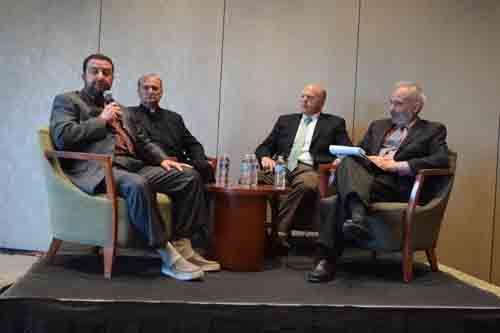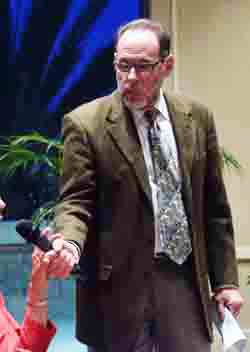
By Donald H. Harrison

SAN DIEGO — No kidding now, a rabbi, a priest, a minister, and an imam walked into a social hall …
They sat together facing an audience at Congregation Beth Israel on Tuesday evening, May 16, and each in turn explained why his religious tradition empathizes with the plight of refugees.
Imam Taha Hassane of the Islamic Center of San Diego remarked that “no one chooses to be a refugee; it is forced upon them” and noted that such a fate even befell the earliest followers of the Prophet Muhammad. In response to their being persecuted, Muhammad sent them to Abyssinia (modern day Ethiopia), telling them that a ‘Christian righteous king” was there. That king allowed them to settle in Ethiopia, and live and pray in peace until it was safe to return to the Arabian peninsula.
Msgr. Dennis Mikulanis, vicar for inter-religious affairs for the Roman Catholic diocese and pastor of San Rafael Parish, said that Mary and Joseph fled with the infant Jesus after the Magi warned that King Herod planned to kill all the infants in his kingdom. Mikulanis also said that Pope Francis in 2016 had declared “a year of mercy,” describing migrants as “brothers and sisters in search of a better life.” When bishops came to see the Pope, Mikulanis continued, instead of a jeweled pectoral cross in commemoration of their visits, Francis presented them with a simple wooden cross made from wreckage of a refugee boat that had washed up.
The Rev. Craig Brown of the First United Methodist Church in Mission Valley said Methodists fled to the colonies because of persecution by the Church of England, adding that “for us welcoming refugees is part of our tradition.” He said at every General Conference of the United Methodist Church, a resolution is adopted reaffirming this principle. “It’s part of our DNA,” he said.
Host Rabbi Michael Berk of Congregation Beth Israel said that when Abraham left Haran, according to historians, that city (believed to be located in modern-day Turkey) was suffering a “terrible war with 15,000 people blinded and mass starvation.” Accordingly, said Berk, even before the Great Exodus led by Moses, “we entered human history as a refugee people.” He said the Torah commands Jews to “love the stranger” 36 times, and directs Jews to take care of the stranger 50 times.
 Irv Kass, a media and management consultant who moderated the panel, asked the clergymen for their reaction to anti-refugee sentiment in the United States.
Irv Kass, a media and management consultant who moderated the panel, asked the clergymen for their reaction to anti-refugee sentiment in the United States.
Brown said he has seen it in his own congregation. In April, he said, the leadership surveyed congregants about what they like and don’t like about services. One current of response was that “we don’t like it when you talk about politics,” by which they meant such subjects as immigration, refugees and care for the earth. “Toxicity continues to grow,” Brown said. The subject of refugees 20 years ago was non-controversial, today it is very hot. “We need to lead them out of that fear.”
Berk suggested that anti-refugee sentiment is not only motivated by fear, but also stems from a clash of values. In Jewish tradition, he said, preserving one’s own life is an important value. “You can’t love your neighbor unless you take care of yourself,” he said. Those who genuinely believe refugees will bring harm resist them based on that belief. On the other hand, the rabbi said, Jewish tradition also teaches that one must have a life morally worth living, which includes providing succor to those in need.
Mikulanis said although outsiders sometimes believe the Catholic Church is a monolithic institution, that is far from the case. On the subject of refugees, he said, there is a split among Catholic worshippers who live north of the Interstate 8 (in the more affluent areas) and those who live south of that freeway. “We can’t let our politics influence our faith, our faith has to influence our politics,” Mikulanis said.
Hassane said the issue of refugees “is a moral topic, not a political one.” Refugees are people who ‘have lost everything but their lives.” San Diego has become a haven for Muslim refugees; first came Afghans, then Somalis, then the Iraqis, and now Syrian refugees, with more coming to San Diego than to other parts of the country. While they are resettled by such agencies as Jewish Family Service, and Catholic Charities, eventually they come to the Islamic Center of San Diego for additional help. “We didn’t know how to handle that at first,” he said, adding that such institutions in the Jewish community as Jewish Family Service and the Leichtag Foundation have been good models.
It is unfortunate, the imam added, that in response some Americans have been gripped by fear. “The U.S. has received thousands and thousands of refugees, and none of them was involved in any act of terrorism,” he declared. He said he was pleased that Muslims who already are settled here are reaching out to the arriving Syrian refugees, bringing them to their homes and helping them to adjust to their new lives.
A woman in the audience asked whether with the Syrian refugees also comes anti-Semitism.
The imam responded that anti-Semitism is farthest from the minds of the refugees. They are worried about where their children will go to school, what kind of jobs they can get — the basics of life, Hassane said.
Asked what the various religious institutions are doing to break down fear, Hassane said members of his mosque participated this last Martin Luther King Jr Day in a community wide cleanup. A beach cleanup also is scheduled. Youth from the mosque work with other youth to feed the homeless, and to provide lodging through the Interfaith Shelter Network. Working together with members of other faith groups in common purpose creates bonds of friendship.
“We are betraying our faiths when we refuse to share God’s blessings,” he also declared.
Mikulanis said such agencies as Caritas Internationalis and Catholic Charities are very involved in the resettlement of refugees, and Berk said the same is true in the Jewish community of Jewish Family Service. Brown said the United Methodist Church helps refugees as they move around the world, and in San Diego has assisted some 3,000 Haitian refugees to re-settle.
The monsignor and the imam also appear together annually at St Michael’s Catholic Church in Poway, where they address 7th graders who sometimes express surprise that clergymen of different faiths can be friends.
Hassane said that he recently spent four Sundays with Rabbi Scott Meltzer of Ohr Shalom Synagogue co-leading a group studying The Witness of Religion in an Age of Fear authored by Michael Kinnamon. He recommended the book for anyone who wants to know more about the subject.
*
Harrison is editor of San Diego Jewish World. He may be contacted via donald.harrison@sdjewishworld.com